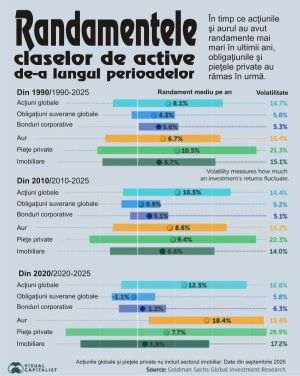The use by natural persons of a digital identification number, as an alternative to the personal numerical code, the option to choose the method of payment of taxes and the modernization of the sale of confiscated goods through online auctions are the measures that the Ministry of Finance wants to be included in the Code Fiscal, in order to accelerate the recovery from taxpayers of debts to the state budget. As for natural persons, they would use a digital identification number instead of the CNP when interacting with the tax authorities. Basically, it is another unique code for proving the identity of the person in relation to the state, which could be more secure and easier to manage in the digital environment.
Yesterday, the Ministry of Finance put into public debate the draft normative act which brings a series of amendments and additions to Law 207/2015 on the Fiscal Procedure Code, in order to adapt the fiscal legislation, so that the degree of collection and payment compliance increases.
Among the changes, we can also find the granting of deferred payment in a simplified form, including for tax obligations with withholding tax, under certain conditions, as well as the possibility of paying tax obligations in the budget revenue accounts related to each type of tax obligation. It is also proposed to simplify the procedures for capitalizing on seized and confiscated assets.
Marcel Boloş, Minister of Finance, stated: "The synergistic effect of all the measures we are implementing to keep tax evasion under control will be visible in the budget execution account. From our experience in combating tax evasion and considering the mechanisms we implement, we have found that we need to manage the problem from several directions in order to monitor and return to normalcy. Our digitization projects converge towards the overall goal of reducing gaps in various categories of taxes and fees. All states that have applied such digitization projects have achieved significant results. All these measures will help us to make better use of budget claims, to reduce the tax burden on taxpayers' shoulders as much as possible, and thus to generate substantial funding for the provision of large public services".
One of the main proposals is to stagger tax liabilities, including for those taxes that are collected directly at source, such as payroll taxes. Basically, if a company has temporary financial difficulties and cannot pay all the taxes at once, it will be able to pay in installments, but it must pay at least 15% of the total amount due from the beginning.
The draft normative act proposes a new method of paying taxes, giving taxpayers the option to choose how to make these payments: either in a single account or in separate accounts for each type of tax liability. This could simplify the process for those who have several types of taxes to pay.
In the legislative initiative, the Ministry of Finance proposes that companies can communicate online with the tax authorities and express their consent for automatic debits from bank accounts for the payment of taxes. Thus, when a fee becomes due, the amount will be automatically withdrawn from the company's account. By manifesting the recurring payment option, the taxpayers/payers agree that, upon meeting the payment terms, the bank account will be debited within the limits of the amounts related to the payment of the declared fiscal obligations, the installments included in the schedule schedules, as well as other obligations that represent condition for maintaining the validity of the granted payment facility.
At the same time, the representatives of the Ministry of Finance want to simplify the procedures for capitalizing on seized and confiscated assets. The draft normative act proposes to simplify the principles of capitalization of goods at the auction, with the aim, on the one hand, to make the conditions for participation in the auction more flexible, and on the other hand, to create the legal framework for the advertising of goods through specialized platforms, as well as for digitalization of the auction organization activity through the online platform.
Another change refers to the reduction of the ceilings in force regarding collection and payment operations in the case of debtors who have set up attachments on cash availability, until the decision to lift it is issued, considering the low degree of debt recovery, as a result of the fact that their financial liquidity is not run through bank accounts.









































